Transform Your Project Delivery with NetSuite
NetSuite project management is a cloud-based professional services automation (PSA) solution that helps businesses manage projects from start to finish with real-time visibility and control. If you’re exploring project management solutions, here’s what you need to know:
- What it is: An integrated project management module within NetSuite’s ERP system
- Key capabilities: Project planning, resource allocation, time/expense tracking, billing automation
- Best for: Professional services firms, consulting companies, and project-based businesses
- Main benefits: Real-time visibility, improved collaboration, reduced project risk
NetSuite project management stands out from standalone tools by connecting your project data directly with financial, CRM, and resource management systems in a single platform. This end-to-end integration eliminates the data silos that typically plague project-based businesses.
“With NetSuite, we are able to see any potential issues ahead of time, which allows us to become very proactive rather than reactive.” – NetSuite customer
The power of NetSuite’s approach comes from centralizing all project information in one system. Project managers get visibility into budgets, resources, and timelines, while executives gain insights into project profitability and performance metrics – all updated in real time.
For professional services organizations, this means better resource utilization, more accurate project forecasting, and faster invoice cycles. The system adapts to various project methodologies including Waterfall, Agile, and the increasingly popular hybrid approaches.
I’m Louis Balla, CRO and partner at Nuage, where I’ve spent over a decade helping companies optimize their NetSuite project management processes and integrating third-party applications to improve system capabilities. My expertise lies in streamlining project workflows and driving changeal growth through effective ERP utilization.
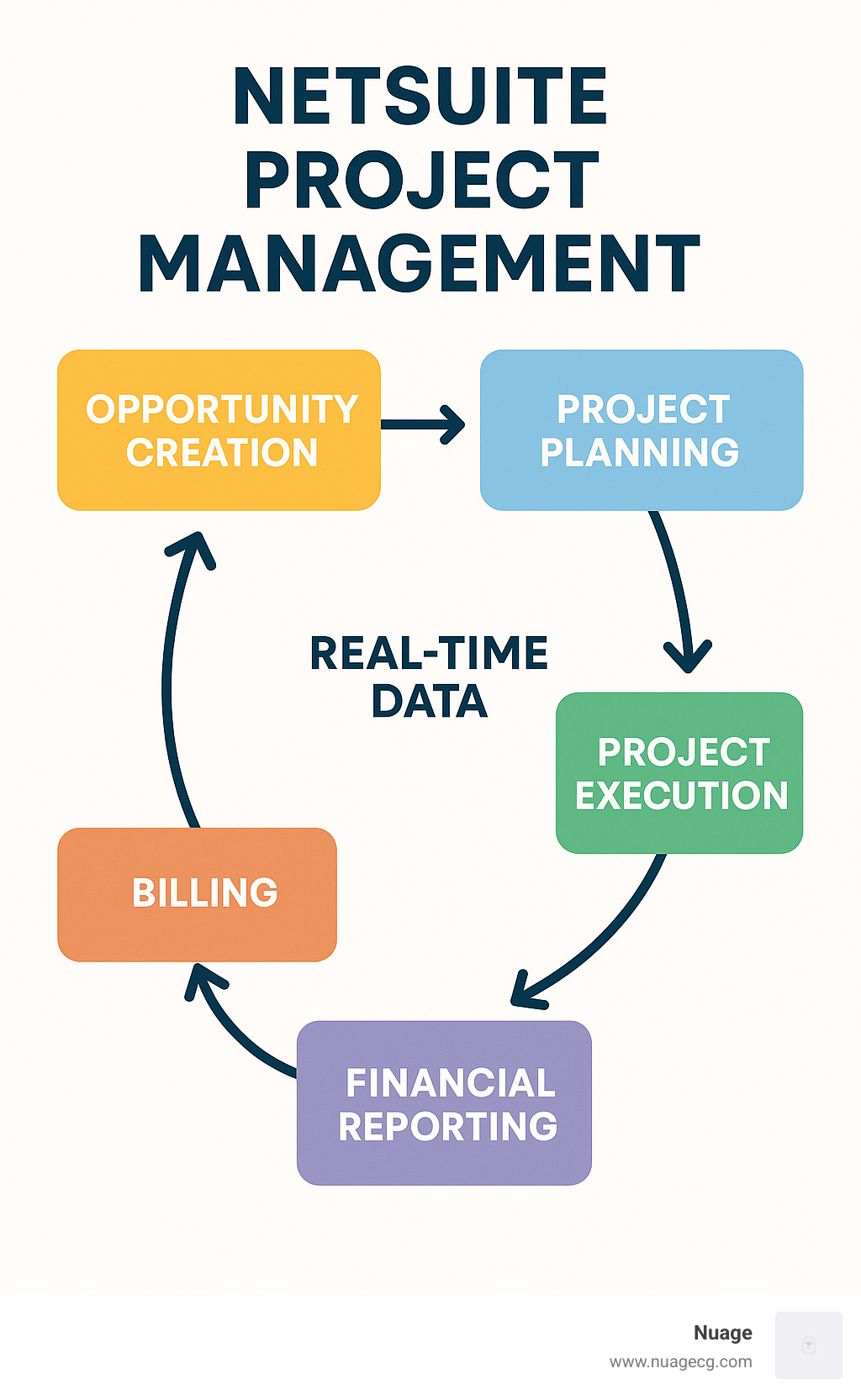
NetSuite project management terms you need:
– NetSuite inventory management
– NetSuite data migration
– NetSuite software optimization
What Is NetSuite Project Management?
NetSuite project management is more than just software—it’s a complete professional services automation (PSA) solution that brings everything project-focused organizations need under one roof. Think of it as your project command center, giving you full visibility from the moment a sales opportunity appears until the final invoice is paid and revenue is properly recognized.
The beauty of NetSuite project management lies in its cloud-based approach. Your team can jump in from anywhere—the office, home, or client site—using any device with internet access. No more waiting until Monday to update project status or approve time entries!
At Nuage, we’ve seen how this accessibility transforms project delivery. Teams stay connected, information flows freely, and bottlenecks become a thing of the past.
NetSuite offers several flavors of its project management solution to match your organization’s complexity:
Basic Projects provides straightforward customer-focused task tracking with time entry and billing capabilities—perfect for smaller teams or simpler project structures.
Project Management expands this with comprehensive planning tools, resource assignments, and deep integration with your sales and order processes.
SuiteProjects Pro (formerly OpenAir) represents NetSuite’s most sophisticated offering, featuring AI-powered risk monitoring that analyzes historical data to flag potential issues before they derail your projects. It also includes intelligent resource allocation that matches team members to projects based on their skills, availability, and past performance.
What is NetSuite Project Management? (Video)
How NetSuite project management works
The workflow in NetSuite project management creates a natural rhythm for your project teams. It starts with project creation—either manually or automatically generated when specific services are sold. From there, project managers define tasks, establish dependencies, and build the timeline.
Resource assignment becomes intuitive as you match team members to tasks based on their skills and availability. As work progresses, your team logs time and expenses directly against their assigned tasks. Managers can monitor progress through real-time dashboards while the system handles billing and revenue recognition according to your predefined rules.
One feature our clients particularly love is automatic recalculation. When changes happen (and they always do!), NetSuite project management adjusts your project plan on the fly. For complex projects with hundreds of tasks, the system uses asynchronous recalculation to keep everything running smoothly.
Project templates are another time-saver, allowing you to create standardized structures for common engagement types. Why reinvent the wheel for each new implementation or consulting project? Templates ensure consistency and dramatically reduce setup time.
Core entities inside NetSuite project management
NetSuite project management revolves around several interconnected entities that form the backbone of your project operations:
Projects serve as the central hub containing all information about a specific engagement—tasks, resources, budgets, and billing rules all live here.
Customers link directly to projects, creating a unified view of all work performed for each client and streamlining the billing process.
Service Items represent the specific services you sell, and can be configured to automatically spawn project records when purchased.
Tasks break down the work into manageable chunks, with the ability to create parent-child relationships for complex work structures.
Resources represent your team members—the people who make projects happen—with their skills, availability, and cost rates all tracked in the system.
Milestones mark significant checkpoints in your project timeline, helping teams stay focused on key deliverables.
What makes NetSuite project management truly powerful is how these entities connect to everything else in your business. When a sales opportunity closes in CRM, it can automatically create a project record with the right services and timeline. As team members log time, those entries flow directly to billing and payroll. This connectedness eliminates the data silos that typically plague project-based businesses.
At Nuage, we specialize in configuring these entities to match your unique business processes—making NetSuite work for you, not the other way around.
Features & Collaboration Tools That Matter
NetSuite project management shines brightest when teams collaborate effectively. The platform offers a rich suite of tools designed to keep everyone on the same page, whether they’re in the same office or scattered across the globe.
Project Planning & Visualization
Planning complex projects becomes remarkably intuitive with NetSuite project management‘s interactive Gantt charts. These visual timelines transform abstract project schedules into clear, actionable roadmaps. Project managers love how they can simply drag and drop tasks to adjust timelines, create dependencies that automatically update related work, and instantly visualize the critical path.
When plans change (and they always do), the baseline feature proves invaluable. It preserves your original plan while allowing you to track variances, giving you powerful insights into how your project is evolving over time.
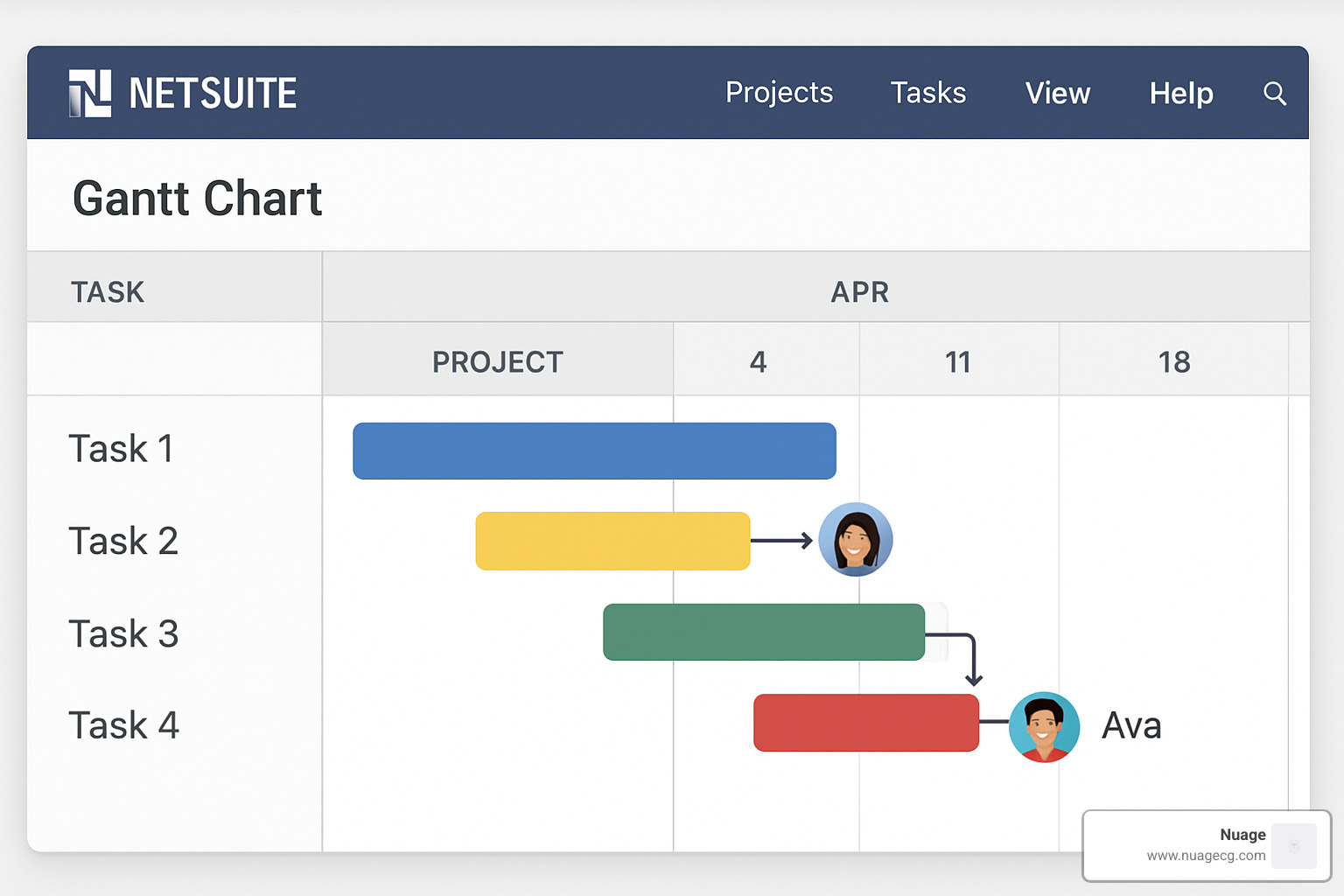
Resource Allocation & Management
The eternal challenge of “who’s available when” finds an neat solution in NetSuite project management. The system intelligently helps you assign the right people based on their skills, current workload, and planned time off. This prevents the all-too-common headache of double-booking resources.
What’s particularly helpful is the bird’s-eye view of resource utilization across all projects. This panoramic perspective helps you balance workloads, prevent burnout on overallocated team members, and maximize billability for those with capacity. The comparison between planned versus actual resource usage often reveals surprising insights that can improve future project estimates.
Mobile Access
Work happens everywhere these days, and NetSuite project management‘s mobile app ensures your team stays connected no matter where they are. Consultants at client sites can submit time entries before heading home. Project managers can approve expenses while waiting for their flight. Team members can check project updates during their morning coffee.
The mobile experience doesn’t feel like a watered-down version of the desktop application. Instead, it’s thoughtfully designed for on-the-go work, focusing on the most critical actions people need when they’re away from their desks.
Project Center
Think of the Project Center as mission control for your project portfolio. This centralized hub brings together everything project-related into a single, organized space with dedicated tabs for different functions. The Home tab gives you that crucial overview of all active projects, while specific tabs for Activities, Time & Expenses, Reports, and Documents provide quick access to the details that matter most.
What makes this approach so effective is how it eliminates the need to jump between different systems or screens to find what you need. Everything lives in one place, accessible with just a few clicks.
Dashboards & KPIs
Data without context is just noise. NetSuite project management transforms raw project data into meaningful insights through customizable dashboards that offer real-time visibility into performance. The color-coded indicators make it instantly clear which projects need attention – red for urgent issues, yellow for potential concerns, and green for on-track work.
These dashboards aren’t just pretty – they’re practical. Each KPI portlet links directly to the underlying data, so when you spot an issue, you can immediately drill down to understand and address it. For example, if you see a red flag for “Time To Approve,” one click takes you to the specific timesheet entries that need your attention.
Time & Expense Tracking
Accurate time and expense tracking forms the foundation of project profitability, and NetSuite project management makes this typically tedious process surprisingly straightforward. The configurable approval workflows adapt to your organization’s needs, whether you need simple manager approval or complex multi-level review processes.
The system’s validation rules catch potential errors before they cause problems – like preventing time entries on closed projects or flagging expenses that exceed policy limits. And because everything flows automatically into project budgets, you always have an up-to-date view of your financial performance.
Issue Tracking
Problems happen in every project. What matters is how quickly you identify and resolve them. NetSuite project management allows teams to document issues at the task level, including all the critical details: description, severity, assignment, due dates, and resolution status.
This granular approach ensures that nothing falls through the cracks. Issues don’t just disappear into email threads or chat messages – they’re tracked, assigned, and monitored until resolution. This accountability drives faster problem-solving and creates a valuable knowledge base for future projects.
NetSuite project management for Agile, Waterfall & Hybrid
The project management world isn’t one-size-fits-all anymore. NetSuite project management accepts this reality by supporting multiple methodologies with equal finesse. According to PMI data, hybrid project approaches have surged from 20% adoption in 2020 to 31.5% in 2023, while traditional methods declined from 58% to 43.9%.
For Waterfall projects, the system provides the structure and predictability these approaches demand – detailed work breakdown structures, sequential dependencies, baseline tracking, and milestone-based billing.
For Agile teams, NetSuite project management offers the flexibility needed for iterative work – sprint planning tools, task boards that visualize work status, and time-boxed iterations that keep work moving forward.
What’s truly powerful is how the system handles Hybrid approaches. You can combine fixed milestones with agile sprints, mix billing methods within the same project, and track both traditional and agile metrics side by side. At Nuage, we’ve seen how this flexibility helps clients adopt modern project practices without sacrificing financial control.
AI-Driven Risk & Forecasting in NetSuite project management
The newest evolution in NetSuite project management – SuiteProjects Pro – brings AI capabilities that fundamentally change how teams manage projects. Rather than just tracking what’s happening now, the system can predict what might happen next.
The AI-powered risk analysis combs through your historical project data to identify patterns that preceded problems in past projects. When it spots similar patterns emerging in current work, it proactively alerts you before issues impact delivery. These early warnings come with suggested mitigation actions, helping teams address problems while they’re still small.
Similarly, the predictive staffing feature transforms resource planning. Instead of manually matching people to projects, the AI suggests optimal assignments based on skills, experience, and availability. It even factors in planned time off and current workloads to prevent over-allocation. At Nuage, we’ve helped clients implement these AI tools to dramatically reduce project risks and improve delivery success rates.
The beauty of these advanced features is how they seamlessly integrate with the core NetSuite project management functionality. They don’t feel bolted on – they feel like a natural extension of the system, enhancing rather than complicating your project management processes.
Financial Control & ERP Integration
The true magic of NetSuite project management happens when project data connects seamlessly with your financial systems. This integration transforms how you control project finances and delivers the financial clarity every service business needs.
Budgeting & Scenario Planning
Creating accurate project budgets becomes remarkably straightforward with NetSuite project management. You can build detailed labor, expense, and purchase budgets based on either cost or billing rates, giving you flexibility in how you plan.
One feature our clients particularly value is the ability to create multiple budget scenarios side-by-side. Want to see how different staffing approaches affect your bottom line? Need to compare various pricing strategies? The system lets you visualize these scenarios with customizable color-coding that instantly highlights variances and helps teams make informed decisions.
Job Costing & Billing Rules
Knowing exactly what a project costs—in real time—is essential for maintaining profitability. NetSuite project management automatically calculates labor costs based on employee rates and tracks all project-related expenses as they happen. The system even allocates appropriate overhead costs to each project, giving you true visibility into your margins.
When it comes to billing, flexibility is key. Some projects need fixed-price billing tied to milestones, while others require time-and-materials with markup. Many modern service engagements combine multiple approaches within a single project. NetSuite project management handles all these scenarios with ease, allowing you to set up billing rules that match your contracts exactly.
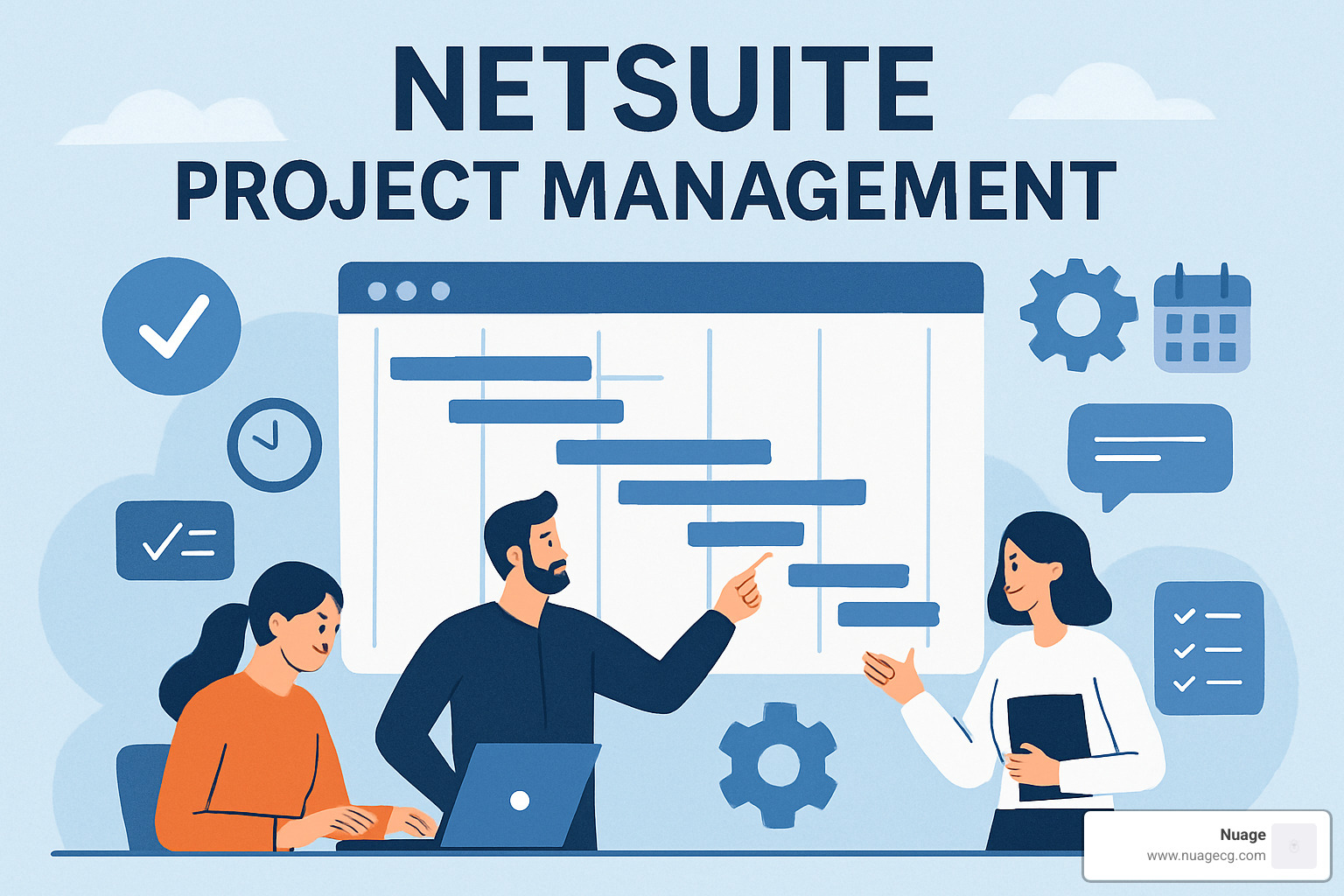
Revenue Recognition
Revenue recognition can be a headache for project-based businesses, especially with evolving accounting standards. NetSuite project management takes the pain away by supporting various recognition methods—percentage-of-completion, milestone-based, time-based for subscriptions, and even multi-element arrangements with different rules for each component.
This means your finance team can maintain compliance while your project managers focus on delivery. The system handles the complexity in the background, ensuring revenue appears on your books at the right time and in the right amounts.
Project P&L & ERP-CRM Synchronization
With NetSuite project management, you get a complete project P&L that includes all revenue sources, direct costs from time, expenses, and purchases, plus allocated overhead. You can analyze margins at any level—project, phase, or task—giving you unprecedented insight into what drives profitability.
The beauty of having project management inside your ERP is that information flows naturally throughout the system. When sales closes a deal in the CRM module, it can automatically trigger project creation with all relevant customer and service details already filled in. No rekeying data, no information gaps.
Linking NetSuite project management to accounting & CRM
At Nuage, we’ve seen how transformative it is when project management connects directly to accounting and CRM systems. This integration creates what NetSuite calls a “single ledger system,” where all project transactions post to the same general ledger.
The practical benefit? Your finance team doesn’t waste time reconciling between systems. Project managers see real-time financial data. Executives get consistent financial reporting across the organization. Everyone works from the same truth.
This integration also automates journal entries throughout the project lifecycle. Time entries generate labor cost journals, expense reports create expense journals, and revenue recognition posts appropriate revenue entries—all following your configured approval workflows.
Perhaps most valuable is the smooth opportunity-to-project flow. Customer information, pricing details, and scope specifications transfer seamlessly from sales to delivery teams. Historical sales data remains linked to project records, creating a complete picture of the customer relationship from first contact through project completion.
Profitability dashboards & reporting
NetSuite project management shines when it comes to understanding project profitability through its robust reporting tools. Project managers and executives get instant access to KPI portlets showing gross margin by project, resource utilization rates, billing efficiency, budget variance, and forecast accuracy.
The system’s variance analysis capabilities help you understand the differences between planned and actual costs, estimated and actual hours, budget and actual revenue, and schedule performance. This insight helps you course-correct early when projects start to drift.
Work in Progress (WIP) reporting gives finance teams visibility into unbilled time and expenses, percentage of completion, over/under billing, and revenue accruals—critical information for accurate financial statements.
For more sophisticated project control, NetSuite project management supports earned value management metrics including Schedule Performance Index (SPI), Cost Performance Index (CPI), Estimate at Completion (EAC), and Variance at Completion (VAC).
At Nuage, we help clients configure these dashboards to focus on the metrics that matter most for their business. The result is a reporting system that drives better decision-making about resource allocation, pricing strategies, and project prioritization—ultimately leading to more profitable projects and happier clients.
NetSuite Projects vs Project Management vs SuiteProjects Pro
Understanding the differences between NetSuite’s project management options can feel like navigating a maze, but it doesn’t have to be complicated. Let’s break down these options in a way that makes sense for your business needs.
NetSuite offers three distinct levels of project management functionality, each designed to support different organizational requirements and complexities. Think of them as good, better, and best options that grow with your business.
Basic Projects is where many organizations start their journey. It provides the essential tools you need for straightforward project tracking:
- Customer-focused task management
- Simple time entry capabilities
- Basic billing configurations
- Fundamental project planning features
This entry-level option works well for businesses with uncomplicated project needs or those just beginning to formalize their project management approach.
Project Management takes everything in Basic Projects and significantly expands the capabilities. This mid-tier option includes:
- Independent project creation (not tied to customers)
- Seamless integration with sales processes
- Comprehensive project planning tools
- Detailed resource assignment functionality
- Complete order-to-cash integration
For most professional services organizations, this level provides the robust capabilities needed to manage multiple complex projects effectively.
SuiteProjects Pro (which was formerly called OpenAir) represents NetSuite’s premium project management offering. This comprehensive solution includes everything in the standard Project Management module plus:
- AI-powered risk monitoring that identifies potential issues before they impact your projects
- Improved staffing tools for optimal resource allocation
- Sophisticated capacity planning across your entire portfolio
- Complex billing rules to handle any financial scenario
- Enterprise-grade resource management capabilities
| Feature | Basic Projects | Project Management | SuiteProjects Pro |
|---|---|---|---|
| Task Tracking | ✓ | ✓ | ✓ |
| Time Entry | ✓ | ✓ | ✓ |
| Billing | Basic | Advanced | Comprehensive |
| Project Planning | Limited | Full | Improved |
| Resource Management | Basic | Standard | Advanced |
| Risk Monitoring | Manual | Manual | AI-Powered |
| Mobile Access | Limited | Full | Full |
| Financial Integration | Basic | Advanced | Comprehensive |
| AI Capabilities | – | – | ✓ |
All versions support mobile access, though the functionality becomes more comprehensive as you move up the tiers. The mobile capabilities allow your team to stay connected to projects from anywhere, which is increasingly important in today’s distributed work environment.
When to upgrade within the NetSuite project management family
Knowing when it’s time to level up your NetSuite project management solution can make a significant difference in your operational efficiency. Here are some clear signals that it might be time to consider an upgrade:
You might want to move from Basic Projects to Project Management when your organization starts managing multiple projects simultaneously, needs more detailed resource planning, or your billing requirements become more complex. This upgrade also makes sense when you need tighter integration between your sales and delivery processes.
SuiteProjects Pro becomes particularly valuable when your team grows beyond 50 resources, you’re looking for AI-driven insights to reduce project risk, or you need to optimize resources across a large portfolio of projects. The advanced billing capabilities also make this tier attractive for organizations with sophisticated revenue recognition requirements.
At Nuage, we don’t believe in one-size-fits-all solutions. We take the time to understand your specific project management challenges and growth plans before recommending which NetSuite project management option makes the most sense for your business. Our goal is to ensure you have exactly what you need—no more, no less—to run your projects efficiently and profitably.
The right project management solution can transform how your organization delivers projects, improving both client satisfaction and bottom-line results. That’s why making an informed choice between these options matters so much for your long-term success.
Implementation Best Practices to Maximize ROI
Getting the most from your NetSuite project management investment doesn’t happen by accident. Based on our years of experience at Nuage helping clients transform their project operations, we’ve identified key implementation strategies that consistently deliver the best results.
Strategic Planning
Before diving into the technical details, take time to understand your current landscape. Map out how your team actually manages projects today—not just the official process, but what really happens. Which parts work well? Where do things break down?
NetSuite project management implementations thrive when you start with clear objectives. Rather than a vague goal like “improve project management,” define specific targets: “Reduce billing cycle time by 40%” or “Increase resource utilization by 15%.”
The most successful implementations we’ve guided at Nuage involve stakeholders from across the organization early in the process. When finance, operations, and delivery teams all have input, you avoid the painful realizations that come weeks into configuration when someone says, “But that won’t work for our team.”
Phased Approach
Trying to transform everything at once is a recipe for frustration. Instead, break your NetSuite project management implementation into digestible phases that build on each other:
Start with core project structures and time tracking—the foundation everything else depends on. Once those processes stabilize, move to resource management, then financial integration, and finally advanced reporting. This approach gives your team time to adapt while delivering early wins that build momentum.
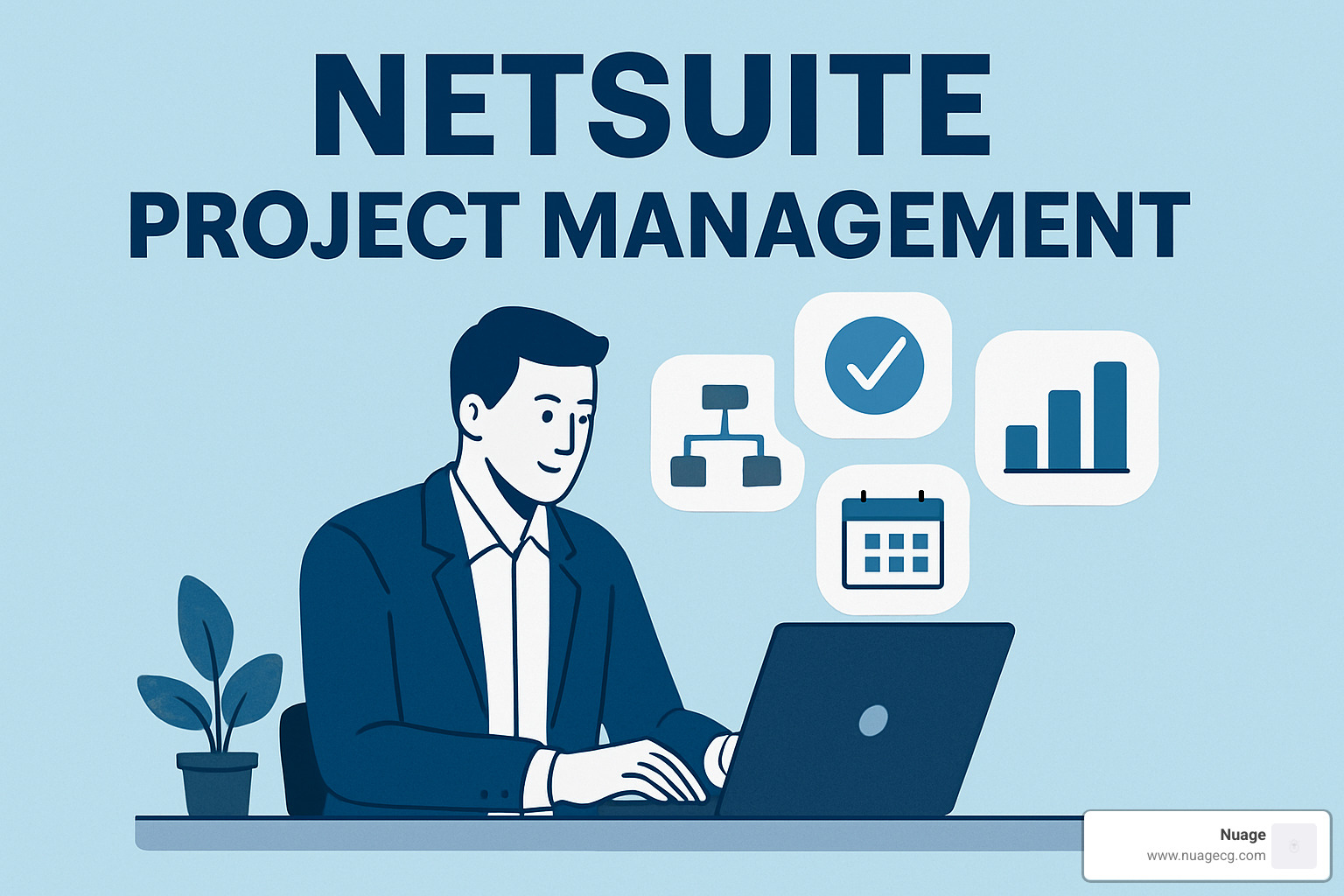
Template Development
One of the most valuable investments you can make during implementation is creating comprehensive project templates. Well-designed templates become the DNA of your project delivery—encoding your best practices into every new project.
When building templates in NetSuite project management, focus on making them practical rather than perfect. Include your standard phases, typical tasks, and common resource roles. Set up default billing rules that match how you typically charge clients. The time invested here pays dividends with every new project you create.
I’ve seen clients reduce project setup time from days to hours with well-crafted templates, while simultaneously improving consistency across their project portfolio.
User Training and Change Management
Even the most brilliantly configured system will fail if your team doesn’t accept it. Effective training for NetSuite project management goes beyond clicking through screens—it needs to connect to how people actually work.
Role-based training makes a huge difference. Project managers need to understand resource allocation and budget tracking, while team members might focus primarily on time entry and task updates. Hands-on workshops where people practice real-world scenarios build confidence far more effectively than passive demonstrations.

Consider establishing a “super-user” program where enthusiastic early adopters become internal champions who can provide day-to-day support to their colleagues. These peer resources often prove more accessible than formal support channels.
Methodology Alignment
With hybrid project methodologies on the rise (up 31.5% since 2020 according to PMI data), your NetSuite project management implementation needs to support your preferred approach, whether that’s Agile, Waterfall, or something in between.
Configure your task structures to match how your teams actually work. If you run sprints, make sure your templates reflect that rhythm. If you use stage gates, build approval workflows that enforce your governance requirements. The system should adapt to your methodology, not force you to change how you deliver projects.
NetSuite Implementation Best Practices
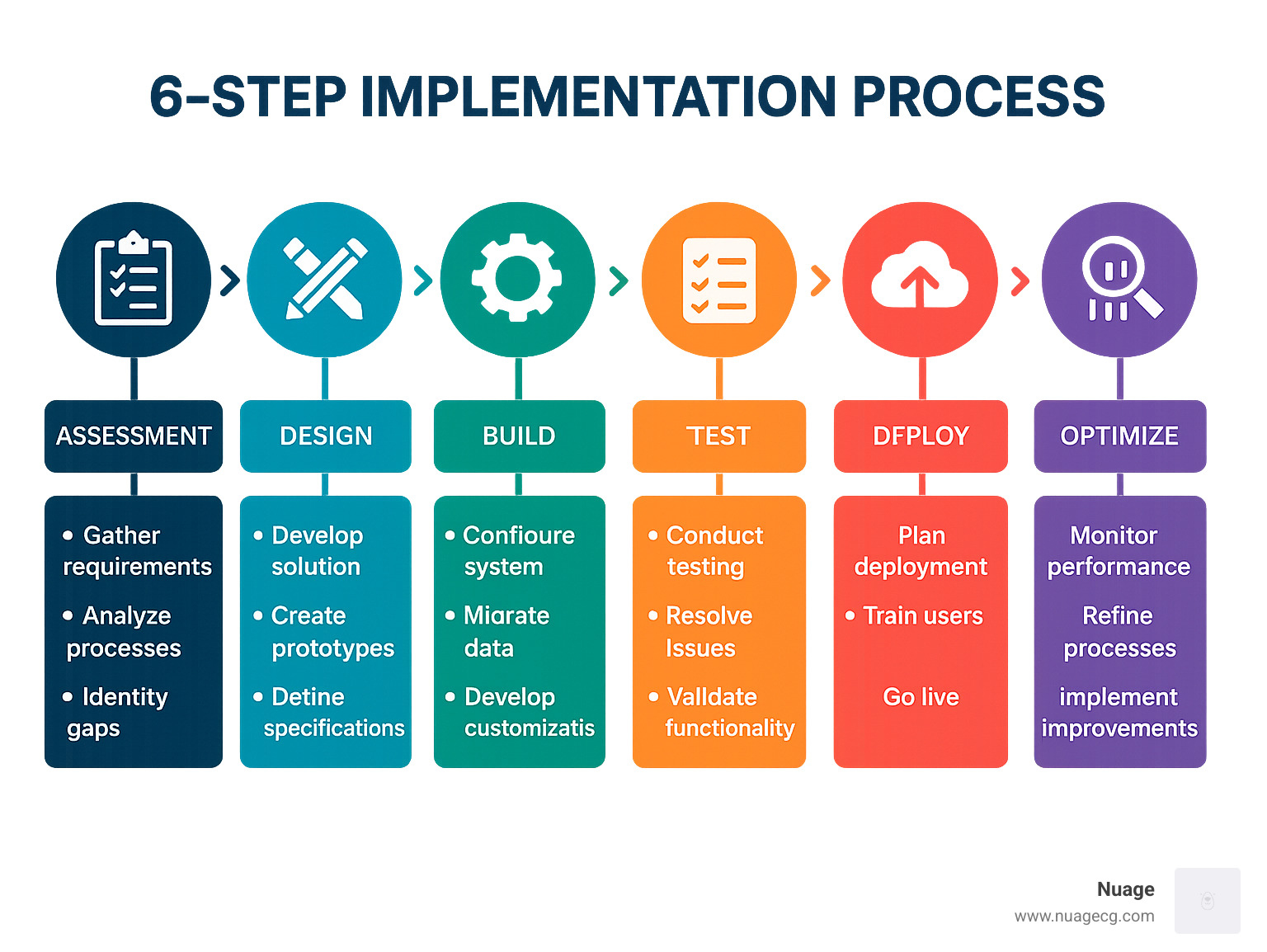
Optimizing NetSuite project management after go-live
The go-live date isn’t the finish line—it’s more like the starting gun for the real race. The most successful implementations continue to evolve after launch, with regular refinements based on user feedback and changing business needs.
Dashboard tuning delivers outsized returns for minimal effort. After a few months of use, you’ll find which metrics actually drive decisions and which ones just create noise. Refine your dashboards to emphasize what matters, and create role-specific views that give each stakeholder exactly what they need.
Custom workflows can transform how your team collaborates. Automating approval processes for timesheets, expenses, and change requests not only saves time but ensures consistent application of your policies. Setting up notification rules keeps everyone informed without manual updates.
Saved searches become increasingly valuable as your project data grows. At Nuage, we help clients build libraries of searches that answer their most common questions: Which projects are at risk? Where are resources overallocated? What’s our current backlog of unbilled time? These tools turn data into actionable insights.
Extending analytics beyond NetSuite project management
While NetSuite project management includes powerful reporting capabilities, some organizations need even deeper analytics. Connecting your project data to specialized tools can open up additional insights.
Power BI integration lets you create interactive visualizations that combine project data with information from other systems. This provides a more holistic view of your business and enables more sophisticated analysis.
The BOLDSuite Analytics Connector offers a streamlined way to connect NetSuite data to external reporting tools, with pre-built reports that accelerate implementation. This approach reduces development time while maintaining data integrity.
Custom SuiteAnalytics leverages NetSuite’s native capabilities for organizations that prefer to keep everything within a single platform. Workbooks can be custom to specific reporting needs and scheduled for automatic distribution.
At Nuage, we’ve helped dozens of clients optimize their NetSuite project management implementations to match their unique needs. Our approach focuses on practical solutions that deliver real business value—not theoretical perfection that never quite works in the real world. The result? Project management systems that people actually use, providing insights that drive better decisions and ultimately improve project outcomes.
Frequently Asked Questions about NetSuite Project Management
What licenses do I need, and how much will it cost?
When exploring NetSuite project management, licensing is one of the first questions that comes up in conversations with our clients. The answer depends on your specific organization and how you’ll use the system.
The licensing structure considers several factors that impact your total investment:
Your user count and types matter significantly – project managers need different access than team members or executives who might only need dashboard visibility. The module you select (Basic Projects, Project Management, or SuiteProjects Pro) also influences pricing, with each tier offering progressively more sophisticated capabilities.
Some organizations also need specialized add-ons like advanced Job Costing & Project Budgeting or detailed Resource Allocation tools, which may affect your total cost.
Rather than quoting generic pricing that might not apply to your situation, we at Nuage prefer to understand your specific requirements first. As a certified NetSuite partner, we can help you design the most cost-effective licensing approach that gives you exactly what you need without paying for features you won’t use.
Does NetSuite project management work on mobile?
Yes! NetSuite project management offers robust mobile functionality that keeps your team connected regardless of location. The NetSuite mobile app (available for both iOS and Android) puts powerful project tools in your pocket.
Team members can submit timesheets while still at the client site, rather than waiting until they return to the office. The app also makes expense reporting remarkably simple – just snap a photo of receipts and submit expense reports on the spot.
For managers, the mobile experience is equally valuable. You can review and approve time entries and expense reports between meetings, keeping projects moving forward even when you’re away from your desk.
The mobile app also provides real-time project status updates and task management capabilities. Team members can check assignments, update task status, and stay informed about project developments no matter where they’re working.
In today’s increasingly remote and hybrid work environments, this mobile functionality has become essential rather than just convenient for most of our clients.
How does NetSuite project management handle fixed-fee vs T&M billing?
Billing flexibility is where NetSuite project management really shines. The system handles virtually any billing scenario your projects might require, whether you’re using fixed-fee, time-and-materials, or a combination of approaches.
For fixed-fee projects, you have several options to match your client agreements:
– Bill upon completion of specific milestones
– Create regular interval billing schedules (monthly, quarterly)
– Invoice based on percentage of work completed
– Bill the entire amount when the project concludes
With time-and-materials projects, the system offers equal flexibility:
– Standard T&M billing for all time and expenses as they occur
– T&M with cap protection to prevent exceeding client budgets
– Cost-plus billing with configurable markup percentages
– Blended rates across resource categories for simplified billing
Many of our clients actually use hybrid approaches, which NetSuite handles beautifully. You might have fixed-fee billing for the implementation phase of a project, but T&M for support or improvement work. Or perhaps you use a retainer model with T&M billing for any work exceeding the retainer hours.
Regardless of your billing method, NetSuite project management also ensures proper revenue recognition in compliance with accounting standards – a critical consideration that standalone project tools often miss entirely.
During implementation, our Nuage team can configure these billing rules to match your specific business requirements, ensuring accurate invoicing and revenue recognition throughout the project lifecycle.
Conclusion
NetSuite project management transforms how organizations deliver projects by bringing everything together in one place. Unlike standalone tools that create data silos, NetSuite connects your projects directly with your financial systems, customer data, and resource management – giving you that elusive “single source of truth” that project-based businesses desperately need.
What makes this approach so powerful is how it adapts to the way you work. Whether your team prefers traditional Waterfall methods with detailed upfront planning, Agile approaches with sprints and iterative development, or the increasingly popular hybrid methodologies that blend both worlds – NetSuite project management flexes to support your process.
The financial control aspect truly sets this solution apart. By integrating project budgets, resource costs, and billing rules directly with your accounting system, you’ll finally have accurate, real-time visibility into project profitability. No more waiting until month-end close to find budget overruns or billing issues.
For organizations using SuiteProjects Pro, the AI-powered capabilities take project management to the next level. The system analyzes patterns from your historical project data to flag potential risks before they impact delivery and makes intelligent recommendations for resource assignments based on skills and availability.
What’s particularly valuable is how the solution scales with your business. You can start with basic project tracking and gradually add more sophisticated capabilities as your needs evolve – without disruptive system changes or data migrations.
At Nuage, we’ve spent over two decades helping companies implement and optimize their ERP systems. We’ve seen how NetSuite project management transforms operations for professional services firms, consultancies, manufacturers with project components, and other project-driven organizations.
Our approach is different from typical implementation partners. Rather than just configuring software, we work closely with your team to understand your unique processes and challenges. We then design a NetSuite project management implementation that addresses your specific needs while incorporating industry best practices.
The results our clients achieve speak volumes: streamlined project delivery, improved team collaboration, reduced administrative overhead, faster billing cycles, and most importantly – increased project profitability.
If you’re struggling with disconnected systems, limited visibility into project performance, or challenges with resource allocation, we’d love to show you how NetSuite project management can transform your business. As your NetSuite optimization engine, we’re here to help you get maximum value from your investment.
Ready to take your project management to the next level? Visit our NetSuite services page to learn more about how Nuage can help you implement and optimize NetSuite project management for your specific business needs.
